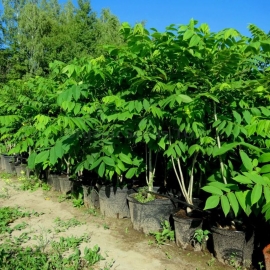






Organic Juglans Walnut Seeds (Juglans lancastriensis)
3.00 €
A tall plantation with a powerful trunk, medicinal leaves and tasty, healthy fruits, on the site the tree grows up to 10 meters in height, the culture is unpretentious, it will develop well in both loamy and sandy soil.
-
Organic Juglans Walnut Seeds (Juglans lancastriensis)
Bred by chance, appeared as a result of natural cross-pollination of two nuts growing side by side: gray and heart-shaped. The event took place in the Lancaster Botanical Garden, for which the tree was given this name.
The Lancaster walnut is a tall plantation with a powerful trunk, medicinal leaves and tasty, healthy fruits. On the site, the tree grows up to 10 meters in height. The culture is unpretentious, can be propagated by the germination of nuts that have fallen to the ground in autumn.
Lancaster walnut is not yet very common in garden plots. But it is likely that the culture will settle in household plots, as it is able to withstand severe frosts.
The tree begins to bear fruit six years after planting. The older the planting, the higher the yield. From a twenty-year-old tree, a gardener will collect about 8 buckets of fruit. Harvest in September.
In May, male and female flowers begin to bloom.The first are collected in brushes of 10-12 pieces, have long pink stigmas. The second we build up long earrings.
Fruit length 3-4 cm, width 3 cm. In shape, they are slightly elongated, heart-shaped. The pericarp is pubescent, there are no partitions inside the fetus. The content of tannins in nuts is low, so there is no bitterness in them.
Every year the tree bears more and more fruit. Unlike walnuts, Lancaster fruits grow in clusters of 8-12 pieces. Divided in half, they look like a medallion.
Walnut Lancaster is promising for cultivation not only in individual farms, but also for industrial production. At the age of 20 years, a tree can produce 110 kg of fruit.
One of the positive characteristics of the tree is its high frost resistance. Culture is able to adapt to harsh climates. Even a slightly frozen nut recovers quickly.
Walnut Lancaster has good immunity inherited from parents. He rarely gets sick. The main enemy of the tree is the mulberry mushroom, from which plantings must be immediately disposed of.
Walnut Lancaster is not picky about the composition of the soil. It will grow well in both loamy and sandy soils. But, for rapid growth and raising immunity, it is better to plant a crop in fertilized soil.
